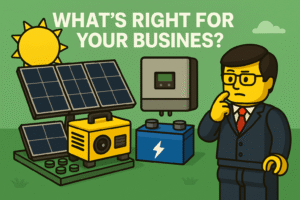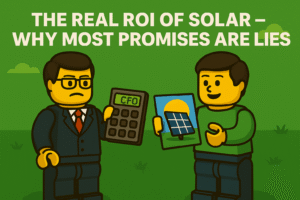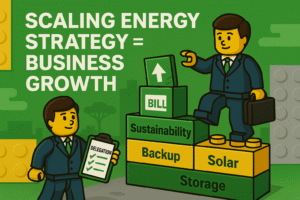“Sustainability” has become one of those words that sounds nice in board meetings…
…and then dies quietly in a PDF.
For a lot of South African businesses, it feels like a PR exercise:
- Reports for investors
- A section on the website
- A slide in the pitch deck
Nice-to-have. Soft. Optional.
But here’s the shift many execs are missing:
Sustainability isn’t about saving the planet first.
It’s about protecting your balance sheet.
The planet matters, obviously.
But the reason sustainability needs to sit at the strategic table is simple: money, risk, and competitiveness.
1. Energy Costs Are Now a Strategic Risk, Not Just a Line Item
Eskom tariffs, municipal markups, diesel costs… they’re all moving targets.
If your business is still planning on the assumption that “electricity is electricity,” you’re already behind.
A proper sustainability strategy:
- Reduces exposure to tariff shocks
- Stabilises long-term input costs
- Makes your forecasts more accurate
That’s not environmental fluff.
That’s core financial risk management.
If you haven’t read it yet, see: The Smart Business Guide to Scaling Energy Strategy.
2. ESG Is Quietly Deciding Who Gets Capital and Contracts
Whether we like it or not, big lenders, investors, and corporates are tightening their ESG requirements.
That looks like:
- Tenders that ask for carbon data and energy mix
- Banks that price in climate and transition risk
- Investors that prefer businesses with credible sustainability plans
If you can’t show progress on energy, emissions, and resilience, you’re going to lose out over time not because someone “hates coal,” but because your risk profile looks worse on paper.
A strong sustainability and energy plan:
- Lowers perceived risk
- Improves access to capital and partnerships
- Puts you in the “serious operator” category
3. Your Customers Are Already Watching
Even if they haven’t said it yet, your best customers are under pressure too.
They’re being asked:
- Who do you source from?
- What’s your supply chain’s footprint?
- Are your partners aligned with your ESG commitments?
When they look at you, they’re not just seeing price and service anymore.
They’re seeing reputational risk.
If you can say:
“Here’s our energy strategy, here’s our trajectory, here’s how we’re reducing risk and emissions…”
…you become a safer choice.
Not just a cheaper one.
4. Sustainability Exposes Waste You’ve Been Ignoring
A lot of “sustainability work” is really just good operational discipline in disguise:
- Eliminating obvious energy waste
- Tightening processes
- Cutting inefficient assets
- Managing peak demand intelligently
Done properly, this drops straight to the bottom line.
It’s not “save the world” stuff.
It’s “stop burning money” stuff.
5. This Is a Competitive Advantage, Not a Compliance Hobby
Most companies treat sustainability as a report.
The smart ones treat it as a differentiator.
They:
- Use energy strategy to control costs
- Use ESG progress to win deals
- Use resilience to position themselves as long-term, investable partners
In a market as volatile as South Africa’s, that becomes a real edge.
If “sustainability” lives with marketing or sits in a report, you’ll always see it as a cost.
If it lives with strategy and finance, you start to see it for what it really is:
- A way to protect margins
- A way to de-risk your business
- A way to unlock capital and customers
Sustainability isn’t about hugging trees.
It’s about making sure your business is still alive and competitive 10 years from now.
If you’re treating energy and sustainability as side projects, you’re leaving value and resilience on the table.
Let’s change that.
We’ll map where you are, where the risk sits, and how to turn “ESG talk” into a concrete plan that actually serves your balance sheet.
And if you haven’t yet, start with the basics:
Read: The Eskom Tariff Trap: How to Future-Proof Your Business Against Rising Costs.
Let’s build your legacy Together
Book a free call to chat about where you need help


